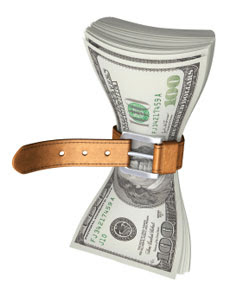
Living in Philadelphia and having many intelligent, multicultural, left-leaning friends, it can seem incongruous to many that I am a registered Republican. The party is tarred as being xenophobic, uncaring, and obstructionist, and many times that broad brush is justified. But I want to affirm my Republicanness in light of a comment I recently overheard being made concerning last year's stimulus bill.
In response to a Republican person's opposition to the government spending, my Democratic colleague responded, "Let's go to such-and-such school, where the stimulus bill saved 100 teachers' jobs, or such-and-such factory, where the stimulus bill created demand that resulted in 100 new openings, or such-and-such construction site, where the stimulus bill put 100 people to work for several months. And when we get to these locations, you tell me whether you would have preferred the stimulus bill to not be passed."
It was so obvious, of course. Would you rather have saved teachers' jobs and created factory employment and generated construction work? The problem with Republicans, seemed to be the implicit statement, was that ideological purity (government spending is bad) was getting in the way of common sense (we have record unemployment and need to put people back to work).
I am not here to argue for or against this particular legislation. All I am pointing out is that comparisons like this concerning government spending of this type are incomplete. The choice is not between good things and nothing, but rather between good visible things and good invisible things. The counterfactual for the stimulus bill is not zero teachers' jobs saved and zero net new factory employment and zero construction work. In spending that money, the government took it away from taxpayers present and future, who could have used it to do things that saved and created jobs as well.
In some cases and in some ways and at some times, it makes sense for governments to spend in this way, say for example if the private sector is so weakened that government spending is superior to private sector spending in stimulating the economy. But it is dangerous to rely on spending and achieving visible results instead of not spending and achieving invisible results. Teachers saved and bridges built and construction workers busy at work are easy to latch onto as success; harder to see are small businesses burdened by higher taxes choosing not to expand, or entrepreneurs deciding not to give it a go at all, or larger firms moving their growth outside of the US.
It is difficult, as a politician who needs to be re-elected every few years, to not give in to the temptation to do something, anything, that can be pointed to as having tangible results. Even if those tangible results are vastly inferior to doing nothing and letting the private sector have a go at it, no one can easily see what good came of doing nothing, and for sure that politician can't take credit for those invisible results. And so, when faced with the opportunity to spend other people's money on visible results that help one get re-elected, or else to advocate for some discipline in spending for the sake of not crowding out private sector innovation, it's not hard to imagine that most rational people will spend and spend and then spend some more.
To be sure, Republicans are just as guilty of this as Democrats. But true conservatism believes in this kind of belt-tightening, as a necessary counterbalance to the natural desire to spend. And that is an important tenet I continue to adhere to, in spite of the puzzlement of my Democratic friends and in spite of the ignorant or wrong-headed ways of many Republican politicians.


No comments:
Post a Comment